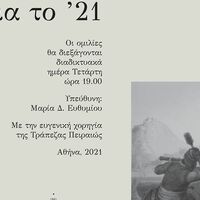The Revolution in the Greek poetry of the 19th and 20th century
Item
Title
The Revolution in the Greek poetry of the 19th and 20th century
Creator
Spatial Coverage
Relation
Subject - keywords
Date
20 October 2021
Abstract
"The aim of the lecture is the annotated overview of the themes regarding the Greek Revolution in Greek 19th- and 20th-century poetry. This overview will examine the gradual transformation regarding poetry of the revolution from contemporary reality (for example, Solomos and Kalvos) into a historical event.
Greek 19th-century poetry, considered in the two main parts of its development, the Heptanese (written in demotic) and Greek (written in katharevousa and formerly known conventionally as the Athenian School or Athenian Romanticism), contains a number of poetic texts dealing with the revolution, recalling it in the memory of later generations, essentially in order to respond to the demands of their own time, first and foremost to the request of the emerging and finally dominant Great Idea in the national ideology (for example, Valaoritis, Zalokostas, etc.). The revolution is still the subject of poetry as a rule in a positive way (for example, Palamas and poets of his generation or subsequently), up to the time of the Asia Minor Disaster, linked to the pillar of national ideology that was the Great Idea. However, after the collapse of the Great Idea, with the Asia Minor Disaster and its tragic consequences, the attitude of Greek poetry towards the revolution gradually began to change to negative (Karyotakis can be considered a poet who wrote both positive and negative poems about the Revolution). As Greek poetry progressed into the 20th century and the poets experienced the historical adventures that marked it (and them) (World War II, German occupation, Civil War, Regime of the Colonels) their attitude towards the revolution became more and more critical."
(Edited and translated description from organiser’s website)
Greek 19th-century poetry, considered in the two main parts of its development, the Heptanese (written in demotic) and Greek (written in katharevousa and formerly known conventionally as the Athenian School or Athenian Romanticism), contains a number of poetic texts dealing with the revolution, recalling it in the memory of later generations, essentially in order to respond to the demands of their own time, first and foremost to the request of the emerging and finally dominant Great Idea in the national ideology (for example, Valaoritis, Zalokostas, etc.). The revolution is still the subject of poetry as a rule in a positive way (for example, Palamas and poets of his generation or subsequently), up to the time of the Asia Minor Disaster, linked to the pillar of national ideology that was the Great Idea. However, after the collapse of the Great Idea, with the Asia Minor Disaster and its tragic consequences, the attitude of Greek poetry towards the revolution gradually began to change to negative (Karyotakis can be considered a poet who wrote both positive and negative poems about the Revolution). As Greek poetry progressed into the 20th century and the poets experienced the historical adventures that marked it (and them) (World War II, German occupation, Civil War, Regime of the Colonels) their attitude towards the revolution became more and more critical."
(Edited and translated description from organiser’s website)
Type specialization
Format
Data sets
Language
Bibliographic Citation
https://youtu.be/Vr07FLGZUfI
https://2021.uoa.gr/anakoinoseis_kai_ekdiloseis/proboli_ekdilosis/21_omilies_gia_to_21/
https://2021.uoa.gr/fileadmin/depts/uoa.gr/2021/uploads/Omilies_23421.pdf
Number Of Pages - Duration
01:15:00
Rights
BY-NC-SA Attribution-NonCommercial-ShareAlike

